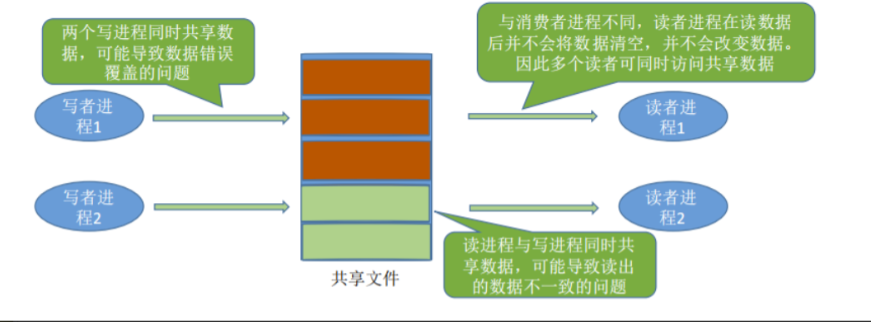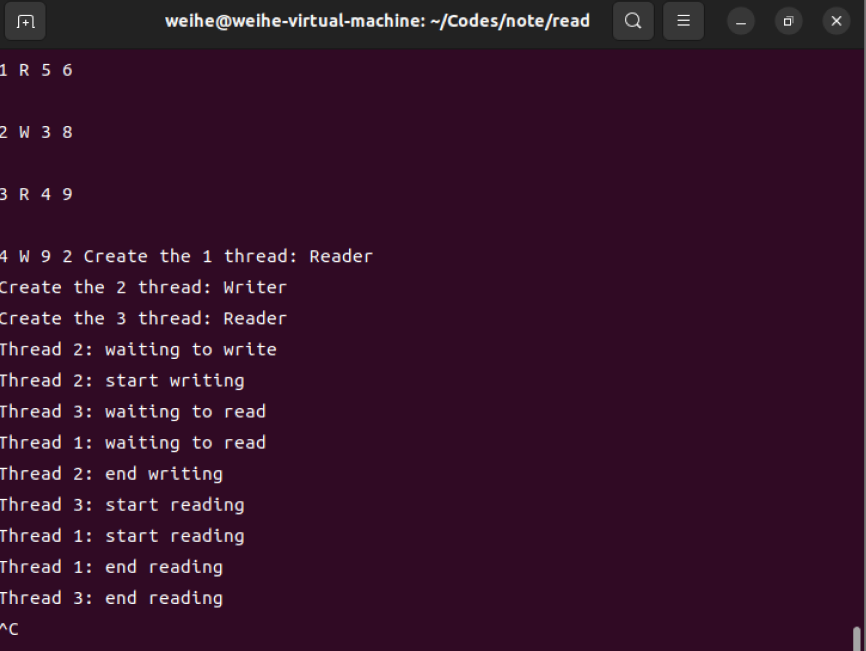读者-写者(多线程)
读者-写者(多线程)
0 推荐在openEuer上实现 1 描述操作系统中“读者-写者”问题,理解问题的本质,提交你理解或查找到的文本资料 2 利用多线程完成reader 和writer 3 在main中测试若干个reader 和writer的测试,提交截图说明代码的正确性
读、写问题是另一个非常出名的同步问题,常常用来模拟数据库的数据查询和数据修改两种情况问题。也即,
一个数据库允许有多个访问者同时对其进行数据访问,但是对于数据的修改只能有一个。那么如何来控制这种访问多个,而修改只能一个的数据操作方式?这也涉及到线程间通信和同步问题。

数据库中存在的情况为:
- 读者、读者可以同时存在;
- 读者、写者不能同时存在,如果读者在前,则写者等待;否则所有读者等待;
- 写者、写者不能同时存在,先到先做,后到等待。
测试代码:
read.c:
/* * 写者优先 */ # include <stdio.h> # include <stdlib.h> # include <time.h> # include <sys/types.h> # include <pthread.h> # include <semaphore.h> # include <string.h> # include <unistd.h> //semaphores sem_t RWMutex, mutex1, mutex2, mutex3, wrt; int writeCount, readCount; struct data { int id; int opTime; int lastTime; }; //读者 void* Reader(void* param) { int id = ((struct data*)param)->id; int lastTime = ((struct data*)param)->lastTime; int opTime = ((struct data*)param)->opTime; sleep(opTime); printf("Thread %d: waiting to read\n", id); sem_wait(&mutex3); sem_wait(&RWMutex); sem_wait(&mutex2); readCount++; if(readCount == 1) sem_wait(&wrt); sem_post(&mutex2); sem_post(&RWMutex); sem_post(&mutex3); printf("Thread %d: start reading\n", id); /* reading is performed */ sleep(lastTime); printf("Thread %d: end reading\n", id); sem_wait(&mutex2); readCount--; if(readCount == 0) sem_post(&wrt); sem_post(&mutex2); pthread_exit(0); } //写者 void* Writer(void* param) { int id = ((struct data*)param)->id; int lastTime = ((struct data*)param)->lastTime; int opTime = ((struct data*)param)->opTime; sleep(opTime); printf("Thread %d: waiting to write\n", id); sem_wait(&mutex1); writeCount++; if(writeCount == 1){ sem_wait(&RWMutex); } sem_post(&mutex1); sem_wait(&wrt); printf("Thread %d: start writing\n", id); /* writing is performed */ sleep(lastTime); printf("Thread %d: end writing\n", id); sem_post(&wrt); sem_wait(&mutex1); writeCount--; if(writeCount == 0) { sem_post(&RWMutex); } sem_post(&mutex1); pthread_exit(0); } int main() { //pthread pthread_t tid; // the thread identifier pthread_attr_t attr; //set of thread attributes /* get the default attributes */ pthread_attr_init(&attr); //initial the semaphores sem_init(&mutex1, 0, 1); sem_init(&mutex2, 0, 1); sem_init(&mutex3, 0, 1); sem_init(&wrt, 0, 1); sem_init(&RWMutex, 0, 1); readCount = writeCount = 0; int id = 0; while(scanf("%d", &id) != EOF) { char role; //producer or consumer int opTime; //operating time int lastTime; //run time scanf("%c%d%d", &role, &opTime, &lastTime); struct data* d = (struct data*)malloc(sizeof(struct data)); d->id = id; d->opTime = opTime; d->lastTime = lastTime; if(role == 'R') { printf("Create the %d thread: Reader\n", id); pthread_create(&tid, &attr, Reader, d); } else if(role == 'W') { printf("Create the %d thread: Writer\n", id); pthread_create(&tid, &attr, Writer, d); } } sem_destroy(&mutex1); sem_destroy(&mutex2); sem_destroy(&mutex3); sem_destroy(&RWMutex); sem_destroy(&wrt); return 0; }




【推荐】国内首个AI IDE,深度理解中文开发场景,立即下载体验Trae
【推荐】编程新体验,更懂你的AI,立即体验豆包MarsCode编程助手
【推荐】抖音旗下AI助手豆包,你的智能百科全书,全免费不限次数
【推荐】轻量又高性能的 SSH 工具 IShell:AI 加持,快人一步
· TypeScript + Deepseek 打造卜卦网站:技术与玄学的结合
· Manus的开源复刻OpenManus初探
· AI 智能体引爆开源社区「GitHub 热点速览」
· 从HTTP原因短语缺失研究HTTP/2和HTTP/3的设计差异
· 三行代码完成国际化适配,妙~啊~